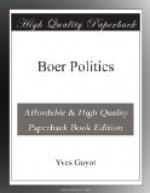[Footnote 21: Le Siecle, April 11th, 1900.]
2.—The Suzerainty and the Conference of the Hague.
How was it that the theorists, who take up the utterance of Dr. Reitz, that: “the Transvaal has the inherent rights of a Sovereign International State,” did not ask the Queen of the Netherlands that the South African Republic might be represented at the Conference of the Hague? It was a grand opportunity, which they no more dreamt of seizing, than the thought of asking that the Bey of Tunis should take part in it.
These documents referred to by us prove that the Suzerainty Question was not raised at the last moment, as the Temps of September 15th, 1899, is affirmed to have stated; that it was not raised only in 1898, as stated by Dr. Kuyper; that at least it was raised on March 6th, 1897; that, since the last mentioned date, it has given rise to an important correspondence; and, finally, that it was the first subject raised by President Krueger at the Bloemfontein Conference.
CHAPTER XVI.
THE ARBITRATION QUESTION.[22]
1.—How the Transvaal interprets Arbitration.
According to the idea prevailing throughout Europe, President Krueger had conceded everything from the franchise point of view, when all was ruined by Mr. Chamberlain raising the Suzerainty Question at the last moment. We have seen the value of these two assertions.
Then, certain members of the ultra peace party ask hotly: “Why did he not accept arbitration?” The word in itself appears to them to possess some sovereign virtue. Dr. Kuyper seems to me to be suffering from that terrible intellectual malady psittacism when he exclaims:—
“Arbitration is the mot d’ordre of modern civilisation.”
and he adds:—
“As if arbitration
were not the rule between masters and
workmen.”
I have often demonstrated the “illusion of such arbitration” (among others see Le Siecle, October 6th, 1899), the negative effects produced in France by the law on optional arbitration, and in England by the Conciliation Act of 1896.
From an international point of view, the judgment passed by the Arbitration Tribunal in the matter of the Delagoa Bay Railway, after a lapse of ten years, is not one to induce governments to have recourse to it.
In the relations between England and the Transvaal, the Arbitration Question is closely connected with the Suzerainty Question. It was raised May 7th, 1897, by the State Secretary, Mr. Van Boeschoten, in reply to the complaints made in Mr. Chamberlain’s despatch of March 6th, 1897, relating to the violation of the 1884 Convention. Mr. Van Boeschoten’s proposal was that the President of the Swiss Confederation should be asked to appoint an arbitrator.
On October 16th, 1897, Mr. Chamberlain replied:—




